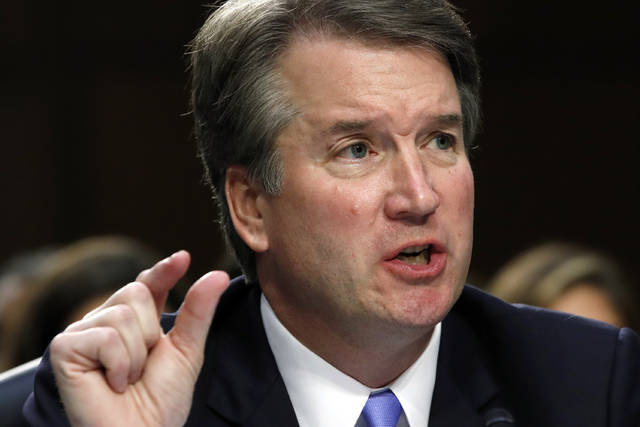WASHINGTON — President Donald Trump’s second Supreme Court nominee, Brett Kavanaugh, is finishing two marathon days of questioning from senators. Some referred to it as the “last job interview” the 53-year-old appeals court judge will ever have, if, as expected, he’s confirmed for the lifetime post.
Others will testify about Kavanaugh on Friday, but his part is almost done. Here’s what viewers learned from the hours of questioning Wednesday and Thursday:
NO MISSTEPS
Kavanaugh didn’t say or do anything during his confirmation hearings that would seem to stand in the way of his becoming the court’s 114th justice. Republican senators hold a 51-49 advantage in the Senate, so as long as Republicans hold together, Kavanaugh will replace Justice Anthony Kennedy on the high court.
“You’re going to get confirmed,” Republican Sen. Lindsey Graham of South Carolina told Kavanaugh during Thursday’s hearing.
Senate Judiciary Committee Chairman Chuck Grassley, R-Iowa, said that there could be a vote on Kavanaugh’s confirmation before the end of the month and that Kavanaugh could be on the court when it opens its new term on Oct. 1.
———
HOT-BUTTON ISSUES
Observers hoping to get a lot of insight into how Kavanaugh might vote in cases involving hot-button issues such as abortion, guns and presidential power were likely sorely disappointed by the hearings.
Kavanaugh declined — as previous nominees have — to give any preview of how he would vote in hypothetical future cases. Kavanaugh demonstrated his mastery of past Supreme Court decisions, but he declined to answer questions about whether certain cases were rightly decided.
Democrats pushed Kavanaugh to answer questions such as whether he believes a sitting president can be indicted, has to testify in a criminal case or can pardon himself. But Kavanaugh called those questions and others hypothetical and declined. Democrats are concerned that Kavanaugh would side with the president in cases stemming from special counsel Robert Mueller’s investigation of Russian interference in the 2016 election.
———
ABORTION
Of all the hot-button issues Kavanaugh was asked about, Democratic lawmakers returned frequently to questions about Roe v. Wade, the 1973 decision establishing a constitutional right to abortion.
Kavanaugh called it an “important precedent” that has “been reaffirmed many times.” He singled out the 1992 Planned Parenthood v. Casey case reaffirming the decision and called it “precedent on precedent.”
But in a 2003 email that became public Thursday as part of the confirmation process, Kavanaugh noted Roe v. Wade could be overruled. Kavanaugh was working for George W. Bush’s White House when he wrote in reviewing a proposed op-ed: “I am not sure that all legal scholars refer to Roe as the settled law of the land at the Supreme Court level since Court can always overrule its precedent, and three current Justices on the Court would do so.”
Asked about that email, Kavanaugh said that he was noting “what legal scholars might say” and that he chimed in because he’s “always concerned with accuracy.”
———
DOCUMENTS AND DEMONSTRATIONS
A fight over documents provided the hearing’s biggest fireworks. Democrats objected over two days to the fact that some documents had been marked confidential and not available to the public as well as the fact that Republicans have declined Democrats’ request for access to documents from a portion of Kavanaugh’s time in the White House. Democrats began both Wednesday’s and Thursday’s hearings on the topic of documents, delaying the start by about an hour.
Demonstrators also provided sparks, popping up in the hearing room frequently to shout objections to Kavanaugh. Republican Sen. John Kennedy of Louisiana said that as of Thursday afternoon there had been some 200 interruptions to the hearing.
———
LOOKING TO 2020
The hearing may have been Kavanaugh’s moment, but Democratic senators weighing 2020 presidential campaigns also seized the spotlight.
California Sen. Kamala Harris produced the only real squirm-inducing moment for Kavanaugh late Wednesday with a cryptic question about whether he had spoken about the Mueller investigation with anyone at the law firm founded by Marc Kasowitz, who has represented Trump. Kavanaugh told Harris he couldn’t think of any such conversations but added that he would need to see a list of the firm’s lawyers. On further questioning Thursday, he said more definitively he had not had such a conversation.
On Thursday, New Jersey Sen. Cory Booker created buzz by saying he was poised to release confidential documents about Kavanaugh even if he risked being penalized for doing so. Warned by Republican Sen. John Cornyn of Texas that senators could be expelled for violating confidentially rules, Democrats and Booker responded, “Bring it on.”
But Republican Sen. Thom Tillis of North Carolina called Booker’s actions “theatrics,” saying Booker had been told hours earlier that he could use the documents he wanted publicly.






When potential judges are subjected to political agendas they should automatically be disqualified because their main objective is to decide cases on its merit, balancing between the pros and cons of litigation and weighed along the lines of human compassion and logic not political ideals, which seems to be the case in this matter.